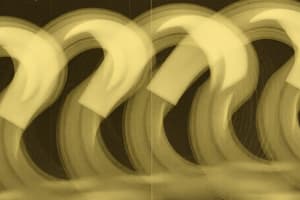Podcast
Questions and Answers
What is the magnitude of acceleration as passengers pass position A on the corkscrew ride?
What is the magnitude of acceleration as passengers pass position A on the corkscrew ride?
- 22.5 m/s²
- 15.0 m/s²
- 35.0 m/s²
- 27.5 m/s² (correct)
At the bottom of the vertical loop, which of the following represents the correct radius of curvature?
At the bottom of the vertical loop, which of the following represents the correct radius of curvature?
- 400 m
- 800 m
- 600 m
- 1200 m (correct)
Which value correctly represents the speed of the airplane at the bottom of the vertical loop?
Which value correctly represents the speed of the airplane at the bottom of the vertical loop?
- 850 km/h
- 600 km/h (correct)
- 750 km/h
- 300 km/h
What is the angle between the line of sight from spacecraft S to Mars and the trajectory b-b?
What is the angle between the line of sight from spacecraft S to Mars and the trajectory b-b?
What is the recorded value of acceleration $
ddot{R}$ at the bottom of the loop?
What is the recorded value of acceleration $ ddot{R}$ at the bottom of the loop?
What is the angle $
ddot{ heta}$ at the bottom of the vertical loop in radians per second squared?
What is the angle $ ddot{ heta}$ at the bottom of the vertical loop in radians per second squared?
Which force results in block B accelerating to the right at 3 m/s²?
Which force results in block B accelerating to the right at 3 m/s²?
What is the absolute velocity of point C relative to block A?
What is the absolute velocity of point C relative to block A?
What is the relative velocity of block B with respect to block A?
What is the relative velocity of block B with respect to block A?
At what angle is the spacecraft S approaching the planet Mars during its trajectory?
At what angle is the spacecraft S approaching the planet Mars during its trajectory?
Flashcards are hidden until you start studying
Study Notes
Problem 9
- Passengers ride the 'Corkscrew' amusement ride which travels through a cylindrical helix
- The velocity at position A is 15 m/s
- The cylindrical helix has an effective radius of 5 meters
- The helix angle is 40 degrees
- The acceleration of the passengers at point A is 27.5 m/s^2
- This problem is related to space curvilinear motion, in particular, cylindrical coordinates
Problem 10
- An airplane flies through a vertical loop in the x-y plane
- The airplane's speed at the bottom of the loop is 600 km/h
- The loop has a radius of curvature of 1200 meters
- The rate of change of the radius (( \dot{R} )) is 34.4 m/s^2
- The angular acceleration (( \ddot{\theta} )) of the plane at the bottom of the loop is 0.01038 rad/s^2
- This problem is related to space curvilinear motion, in particular, spherical coordinates
Problem 11
- A spacecraft ( S ) approaches Mars along a trajectory
- The spacecraft's velocity is 19 km/s
- Mars' velocity is 24.1 km/s
- The angle between the spacecraft's trajectory and Mars' orbital plane is 15 degrees
- ( \beta ) is the angle between the line of sight ( S-M ) and the spacecraft's trajectory ( b-b )
- ( \beta ) is calculated to be 55.6 degrees.
- This problem is related to relative motion
Problem 12
- Block B accelerates to the right at a constant rate of 3 m/s^2 due to a force ( P )
- Block B's velocity is 2 m/s to the right
- Block B's acceleration is 0.5 m/s^2
- Block A's acceleration is 0.75 m/s^2
- The absolute velocity of point C is 1 m/s to the right
- The velocity of Block B relative to Block A ( v_{B/A} ) is 0.5 m/s
- This problem is about the constrained motion of connected particles
Studying That Suits You
Use AI to generate personalized quizzes and flashcards to suit your learning preferences.




